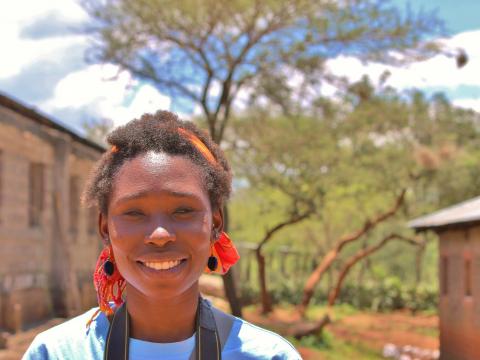Telling one child's story

Lucy Amatikide Murunga works for World Vision Kenya as an Emergency Communications Officer. She writes here about why she feels compelled to work as a humanitarian.
What does Humanitarianism mean to you in one word? Responding
Why did you become a humanitarian worker or volunteer?
In 2009, I visited a village in Turkana where World Vision was providing relief assistance to drought affected victims and I recall seeing children, men and women in very bad shape, scrambling to receive food under very difficult conditions. It was heartbreaking to witness. History repeated itself in 2011, when I traversed Kenya, telling stories of people who had been devastatingly impacted by the drought. The story of one particular child, who unfortunately succumbed to malnutrition, really touched my heart. I recall writing his story with tears rolling down on to my keyboard. My greatest motivation was that, through passionately telling the story of this one child, I could help many others. I knew then that humanitarian work is what I wanted to do.
What's the most rewarding part of your work?
The most rewarding part of my work is knowing that, out of the many stories I share, even if it’s the story of just one child, it represents the story of many. If bringing attention to how disasters affect children results in action to save others, then I feel I have made a difference.
What are some of the more challenging aspects of your work?
The greatest challenge is having a first hand encounter with so much suffering. I have personally witnessed two children die before me. I recall one time at a children’s nutrition centre in Angola I stood visibly shaken as I watched a distraught mother watch her baby fight to survive.
The disturbing images we get to see of disaster-affected victims also continue to haunt me.
I also experience personal challenges through my work, as only last week my aunt and her family were affected by violence which had broken out in Kenya and displaced many families. When I first was informed of the news it came as a shock. I spoke to one of my cousins and told her that, in my field, I witness a lot of suffering but never in my life would I imagine that it would happen to someone so close. The following day, I saw my aunt on television speaking to the media and I again encountered her name in the newspapers. It was tear-jerking to read what she went through. This is a sad reality I must confront, that it could happen to anyone, and we live in a world where a lot of people need our help, so let's do our best to respond to their needs and help.
Tell us a little bit about the work you do.
As an emergency communicator, my role is to keep the information pipeline flowing with useful and engaging information. I collect information and share it with various audiences. I report on humanitarian stories, with a focus on children, always advocating for a rapid response to meet the needs of those affected.
What is the most memorable moment you’ve experienced during your work?
My most memorable moment was in February this year. I met an 8-year-old girl named Marieta at the Kenya-Sudan border. She was in the company of her mother - who had just given birth three days ago - and two younger siblings. They had fled violence in South Sudan and had come to seek refuge at Kenya’s Kakuma refugee camp. Marieta had a sadness in her eyes. She and her siblings were visibly tired, hungry and thirsty. I had no food to offer, but I bought them water and soda. I recall Marieta’s face light up with joy as I opened the can and handed her the soda.
Soon a shy Marieta became friendlier and she would often smile at me when I looked her way. Marieta and her family would soon board a bus and head to the temporary shelter at the Kakuma refugee camp. I talked to the UNHCR officials to see if they could provide alternative means for the new mother and her young children and we were lucky to find an ambulance that ferried them to the camp. I couldn’t be happier to leave knowing that they were comfortable.
Upon arrival the next day I rushed to ensure they had arrived well and helped them settle in the new tent. For the 10 days I was in Kakuma I checked on them every day. Everyday, I showed up with nothing but myself and it moved me to tears just to see Marieta and her family get so excited to see me. Despite the language barrier, through our exchange of smiles, giggles and play, we greatly bonded.
The sight of Marieta’s glazed and sad eyes, clad in a green and black print dress and sandals standing in a line to receive food is still fresh in my mind. I will never forget her; I just cannot forget her; I do not want to forget her.